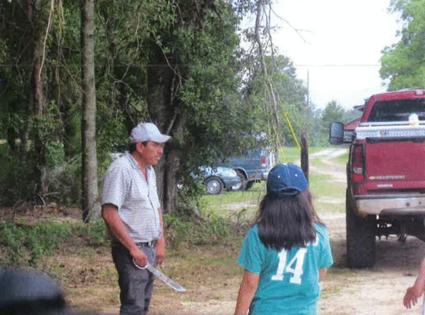
David J. Neal, Miami Herald on
MIAMI — If you bought melons sold at Kroger, Schnucks, Walmart, its big box club offspring, Sam’s Club or other chains, they might’ve been harvested or packed by H-2A visa workers provided by Los Villatoros Harvesting, a Bartow company run by Bladimir Moreno. If they were, that fruit reached your table via victims of federal RICO and slavery law violations.
Moreno, 56, violated federal RICO and slavery laws in getting those workers from Mexico to the United States, then abusing them once they were here. He admits this in his guilty plea in Tampa federal court to RICO conspiracy and conspiracy to commit forced labor.
That combination earned him a sentence of nine years and 10 months in federal prison with $173,125 restitution to 17 of those workers. That’s an average of $10,183 per worker.
The U.S. Department of Labor said Moreno, who was also a defendant in a North Carolina federal civil court class action lawsuit concerning treatment of workers, has been debarred from participating in the H-2A temporary agricultural workers visa program again. Along with his ban, Moreno got hit with $203,350 worth of penalties.
To abuse workers over several states for a couple of years takes a team effort.
Guadalupe Mendes Mendoza got time served and two years of supervised release after pleading guilty to conspiracy to defraud the United States. Efrain Cabrera Rodas got three years and five months for racketeering. Christina Gamez is scheduled to be in FCI Tallahassee until July 22, 2025.
As Moreno’s attorney Anthony Suarez noted in a court filing, while Gamez is doing time, she has two companies up and running: G3 Sisters with Pamela Gamez and Melissa Gamez, and JM Citrus with Mendes.
Suarez said the companies provide immigrant workers.
The H-2A Visa worker program
If a company expects a shortage of U.S. workers for seasonal work, it can use non-immigrant foreign workers through the H-2A guest worker visa program. “Seasonal work” often involves either agriculture or tourism.
There are guidelines employers must obey:
— Try to get U.S.-based workers for the job first.
— Set H-2A workers up with housing and transportation to the job site.
— Provide meals if the housing doesn’t have kitchens or kitchenettes. Some employers put their H-2A workers up in motels with cooking facilities.
— Pay H-2A workers special rates.
— Provide H-2A workers with at least 75% of the work specified in the job contract.
Some companies directly employ H-2A workers. Others use workers provided by businesses such as Los Villatoros Harvesting.
Forced labor in Florida and elsewhere
Moreno’s guilty plea admission of facts says from 2015 through 2017, Moreno violated the H-2A program and his workers rights in myriad ways.
His recruiters in Mexico, relatives and associates, made prospective workers pay “a significant fee” to work for Los Villatoros. They lied about reimbursing the workers for their expenses in getting to the United States and about how much they would be paid for their work here.
He also “used the debts LVH recruiters had imposed on LVH’s H-2A workers to manipulate and coerce the workers into continuing to work for the company by falsely informing the workers that they would be reimbursed if they continued to work for LVH.”
Once here, LVH violated federal laws by yanking workers from where they were supposed to be working in Florida to, the U.S. Department of Labor said, “an unapproved Florida farm, and then relocating them to work in Kentucky and Indiana intermittently.”
Labor said LVH workers harvested watermelons for Wachula’s Carlton Farms, Penny Carlton, James Carlton and Scott Carlton’s company which does business as Sun Fresh Farms. Those watermelons, Labor said, were sold by Walmart and Kroger. The melons packed in the Hoosier State by LVH workers for Oaktown, Indiana’s Cardinal Farms and Vincennes’ Wonning Melons were sold by a distributor to chains that included Kroger, Schnucks and Sam’s Club.
Meanwhile, the workers’ housing barely merited the word.
Moreno’s guilty plea said he knew about six workers in one hotel/motel room and 75 workers in a warehouse. Labor’s Wage and Hour Division investigators found each worker didn’t have a bed to himself and, in one location, there were 44 workers in 10 rooms.
A restaurant was supposed to provide food for LVH’s H-2A workers. But, Moreno had another company actually do it and charged the workers.
LVH employees, the guilty plea said, would hold onto the passports (an illegal act on its own) “for the purpose of discouraging workers from fleeing LVH so the workers would be coerced to continue laboring for LVH” under the poor conditions.
Also, Moreno himself “repeatedly and consistently” told the workers they would be deported or arrested if they didn’t keep working or tried to escape.” When investigators came around, Moreno tried to intimidate the workers into silence.
He “harbored and concealed” workers whose time with LVH should’ve been done in Georgia, North Carolina, Missouri and Indiana.
Labor said, “Workers who escaped their unhealthy living and forced labor conditions first reported the violations to the Coalition of Immokalee Workers, a community-based human rights organization in Florida.”
©2023 Miami Herald. Visit at miamiherald.com. Distributed by Tribune Content Agency, LLC.
















